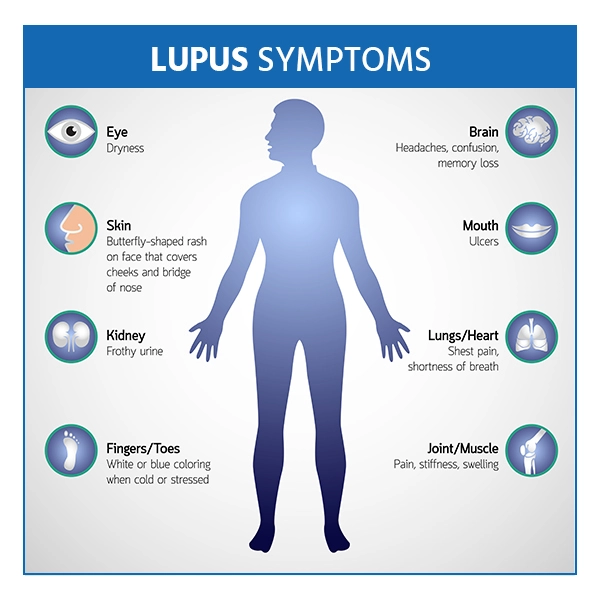Lupus: Causes,Complications & Treatment
Lupus is a condition in which the body's immune system attacks its own tissues and organs (called autoimmune disease). Lupus can cause inflammation in the joints, skin, kidneys, blood cells, brain, heart, and lungs, among other physiological systems. Lupus is difficult to diagnose since its symptoms and signs are often similar to those of other illnesses. The most distinguishing symptom of lupus is a face rash that looks like butterfly wings unfolding over both cheeks. This rash appears in many but not all cases of lupus.
Symptoms of Lupus
There are no two cases of lupus that are the same. Symptoms and signs might appear abruptly or gradually, be moderate or severe, and be transitory or permanent. Most people with lupus have a moderate form of the disease marked by flares, which occur when signs and symptoms worsen for a period of time before improving or perhaps disappearing completely. Your lupus signs and symptoms will vary depending on which body systems are affected by the condition. The following are the most common signs and symptoms:
- Fatigue
- Fever
- Joint pain
- Skin lesions
- Fingers and toes turn white or blue when exposed to cold
- Breathlessness
- Chest pain
- Dry eyes
- Headaches
- Memory loss
Nerve damage symptoms
- Peripheral neuropathy deals with tingling, numbness, or weakness in the extremities.
- Cranial neuropathy deals with facial paralysis, double vision, or other problems with eye movement or facial sensation.
- Autonomic neuropathy deals with dizziness, fainting, abnormal sweating, or digestive issues.
- Central nervous system involvement deals with headaches, seizures, cognitive dysfunction, memory problems, mood changes, or psychosis.

Causes of Lupus
Lupus is an autoimmune illness in which the immune system assaults healthy tissue in the body. Lupus is most likely caused by a mix of your genetics and your environment. It indicates that people who have a hereditary susceptibility to lupus may get the disease if they come into contact with a trigger in the environment. However, in the vast majority of instances, the cause of lupus is unknown.
The following are some possible triggers:
- Sunlight : A person with lupus, exposure to the sun might cause skin lesions.
- Infections : Infections can trigger lupus.
- Medications : Certain blood pressure drugs, anti-seizure medications, and antibiotics can all cause lupus.
Risk Factors of Lupus
The following factors may raise your lupus risk:
- Women are more likely to develop lupus.
- Lupus can affect persons of any age, however, it is most commonly diagnosed in people between the ages of 15 and 45 years.
Diagnosis of Lupus
Lupus is difficult to diagnose since indications and symptoms differ greatly from person to person. Lupus symptoms might fluctuate over time and overlap with those of a variety of other illnesses. Lupus cannot be diagnosed with a single test. The diagnosis is made using a combination of blood and urine testing, signs and symptoms, and physical examination findings.
The following tests may be performed on your blood or urine:
- Complete blood count : This test determines the number of red blood cells, white blood cells, and platelets, as well as the amount of hemoglobin, a protein contained in red blood cells. The findings could indicate that you have anemia, which is common in lupus patients. A decreased white blood cell or platelet count is another symptom of lupus.
- Erythrocytes Sedimentation Rate : This blood test determines how quickly red blood cells drop to the bottom of a tube in one hour. A higher-than-normal rate may indicate a systemic disease such as lupus. The rate of sedimentation isn't exclusive to any one condition. It may be elevated if you have lupus, an infection, another inflammatory illness, or cancer.
- Test of the kidneys and liver : Blood tests can be used to determine how well your kidneys and liver are working.
- Urinalysis : A test of a sample of your urine may reveal an elevated protein level or red blood cells in the urine if your kidneys have been damaged by lupus.
- Test for antinuclear antibodies (ANA) : A positive test for these antibodies, which your immune system produces, indicates that your immune system is activated. While the majority of people with lupus have a positive ANA test, the majority of those who do not have lupus do not have a positive ANA test. If you test positive for ANA, your doctor may offer more specific antibody testing.
If your doctor feels that lupus is damaging your lungs or heart, he or she may recommend the following Imaging test:
- X-ray of the chest : Abnormal shadows in your chest picture could indicate fluid or inflammation in your lungs.
- Echocardiogram : Sound waves are used to create real-time photographs of your beating heart in this exam. It can look for abnormalities with your heart's valves and other parts.
- Biopsy : Lupus can damage your kidneys in a variety of ways and therapies vary depending on the severity of the damage. In some circumstances, a small sample of kidney tissue must be tested to establish the best treatment option. A needle or a minor incision might be used to acquire the sample.
